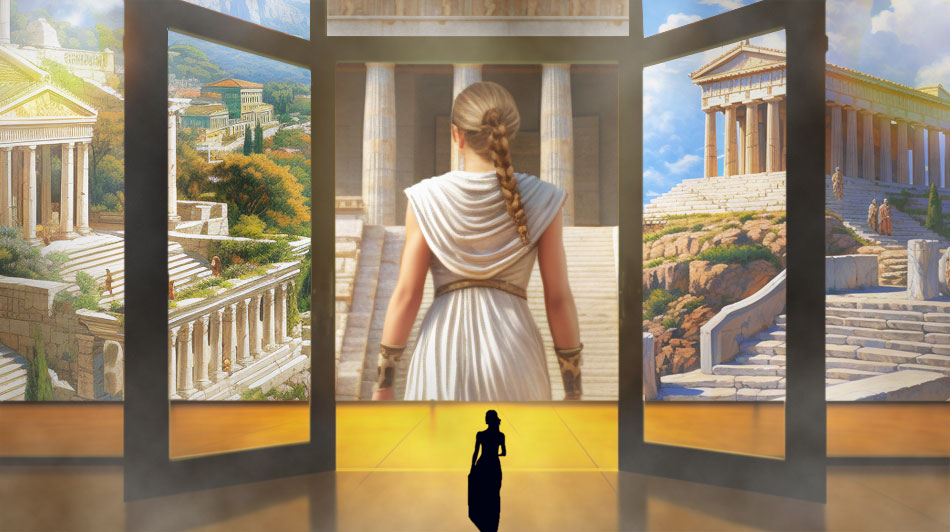How Past Life Exploration Can Heal Your Life ~ Part II
 by Denise Linn
by Denise Linn
Through analysis of your present strong tendencies you can pretty accurately surmise what kind of life you led before.” – Paramahansa Yogananda, from Man’s Eternal Quest
Discovering who you were in a past life can be easy and fun! There are a number of methods you can employ and learn in order to uncover amazing evidence of your previous lives without ever doing a regression. When you examine the present, you can pick up hundreds of clues that can help you glean information from the past.
No single factor can provide all the answers, but if you gather them together, you can begin to solve the puzzle of who you might have been in previous incarnations. Here’s a list of the areas of your life that we’ll explore in more detail:
Childhood games
Childhood preferences and inclinations
Clothing styles
Architecture and home-furnishing styles
Food preferences and eating habits
Allergies
Geographical locations
Climates
Cultures
Time periods or historical events
Music
Scents, aromas, and smells
Deja vu experiences
Talents and abilities
Occupations and hobbies
Heritage and ancestry
Your name
Books and films
Animals and pets
Personality traits, mannerisms, and habitual behaviors
Relationships
Causes you’re passionate about
Traumatic events
Fears and phobias
Words and phrases you use
Body type
Health Issues
Scars, birthmarks, and tattoos
Injuries, diseases, and surgeries
Dreams
Childhood Games
The most common childhood games are the result of programming by society. For example, a young girl is given a baby doll and is told that she’s its mother. Her games of playing “Mom” to her baby are, in part, conditioned by her culture. Other kids’ games are the result of a child symbolically imitating or acting out the behavior of adults. A young boy might observe his father doing repairs around the house, and he’ll then fashion a make-shift hammer and pretend he’s making bookshelves. Sometimes, however, playtime activities are a residue of memories from earlier lives. As you examine the games that you instinctively played, look for possible reflections that could have originated in the distant past.
For example, I had a friend who as a child used to make a prison-like structure out of cardboard; then she’d climb inside it and pretend she was starving. She even got her friends to “sneak” small pieces of stale bread to her. When my friend was an adult, she spontaneously remembered living in a concentration camp. As soon as she recalled that event, she understood why she had played that game over and over again as a child – she was reenacting a significant experience from a past life.
Here’s another example: As a child, Chantal used to persuade her friends to lie down and act like they were wounded. She then painted various parts of their bodies with red paint to simulate blood and asked her “patients” to moan. She’d rip up her mother’s rags to make bandages, and sometimes she’d even pretend to amputate someone’s limb that was “too far gone.” In her past life regression, Chantal recalled being a doctor on the battlefields of France during the Napoleonic Wars; her childhood game echoed that previous lifetime.
When I was six, I used to explore the woods by our house and would spend hours alone picking small bits of different plants and tasting them. I’d bring a bunch of my selections home, let them dry, and then attempt to grind the dried plants into powder. I called my concoctions “medicine” and would try to get my friends to take some if they weren’t feeling well. I now believe that this activity was based on my memories as a Blackfoot Indian, gathering medicinal herbs for my tribe.
A skeptic might say this behavior could have been the result of being influenced by stories I’d heard or information that I’d subconsciously absorbed from my mom or dad. But my parents never used herbs and neither did my Cherokee grandparents. Why would a six-year-old fixate on one particular activity to the exclusion of all others? There can be many reasons, and one answer is that it can be traced to a previous life.
And how does a skeptical individual explain a child who’s a master musician even though his or her parents aren’t musically talented? It’s enormously valuable to observe childhood games, for they often hold important keys to understanding past lives.
Childhood Preferences and Inclinations
The younger the child, the more potent past life memories usually are. My grandmother told me that when I was three, I’d get very irritated with her because she didn’t remember our previous life together. She said that I’d plaintively ask again and again, “Don’t you remember when we were sisters?”
When my daughter, Meadow, was three, she used to talk about her servants. I found this rather curious, considering that we maintained a casual lifestyle and often ate our meals seated on the floor. (This could probably be traced to my Native American life, sitting and eating by the fire.) However, even as a three-year-old, Meadow insisted on sitting at the table and would place numerous spoons, forks, and knives neatly next to her plate, as if in a formal dinner setting. Then she’d ask me to arrange the food on her plate into a beautiful presentation. This ritual was very important to her and was completely different from our brown-rice-with-vegetables lifestyle.
She’d also request that I place her clothes on the bed. She’d plead, “My servants used to lay my clothes out for me. I don’t know how to dress myself.” When her friends came over, Meadow would organize genteel games along with elaborate tea parties. One day they went outside to play, and I encouraged her to join them.
She responded gravely, “I’m not allowed to play outdoors with other children. I must not soil my clothes.” The pain and sadness of a lonely royal had seemingly filtered down into her childhood games.
Children’s attitudes can often be attributed to their environment or upbringing, but I don’t think this is the case for Meadow, as my husband and I are relaxed and informal. Meadow continues to be quite the lady; however, I can’t help but think that she chose us as parents in order to balance a past life that was extremely traditional and rigid.
Asking family members what you were like as a child can also be helpful. One of my friends told me that one day, many years ago, she was driving in her car with her four-year-old daughter and when they drove over a bridge, the little girl causally said, “These are the killing waters.”
Shocked, my friend asked her daughter what she meant, and she proceeded to tell her mom that she had drowned in the water below when she and her “other brother” were swimming, and her “other mother” was very sad. My friend, who had no interest in reincarnation at the time, researched local papers and discovered that more than 30 years earlier, a brother and sister had been swimming at that exact spot . . . and the young girl had drowned. (As my friend’s daughter grew older, she lost all memories of this event.)
Clothing Styles
Valuable clues to your past lives can often be found in the types of clothing you’re drawn to (or that you detest). For example, if you prefer long, flowing scarves and soft, loose fabrics (and you love the tall, stately stone pillars of Greek architecture), you might have spent a previous life in ancient Greece. Of course there can be many reasons why you enjoy those particular styles, but as you begin to assemble clues, your aesthetic preferences can be very helpful in understanding the whole picture.
Are you attracted to gypsy, peasant, or military fashions? Does a specific ethnic style appeal to you? Do you enjoy wearing long dresses or dinner jackets, or do you loathe formal wear and just like to feel comfortable? Are there certain types of hats that you’ve worn regularly? I knew an American man who donned a Greek-style cap every day; he discovered that he’d been a Greek sailor in a past life. A French man I knew who always wore a cowboy hat found that he was once a cowboy in the 19th century Wild West. An Australian woman with a penchant for berets realized that she’d been in the French Resistance during World War II.
The colors of clothing may also have past life significance. For example, I knew a woman who always appeared in saffron yellow garments – it was more or less her trademark. During a regression, she recalled being a Hindu monk in India, wearing saffron-colored robes daily.
Architecture and Home Furnishing Styles
Examine the architectural styles that you admire. Are you fascinated by Tudor, Georgian, or Victorian designs; or are you interested in structures such as cabins, tepees, yurts, cliff dwellings, or perhaps even castles and Greek temples? What do you like and dislike?
Caitlin had a fascination with yurts and managed to live in a number of them. She understood her passion when she regressed to a life in Mongolia, where she and her family had lived in a yurt. Charles loved castles so much that after he retired he constructed a facade for his home, giving it castle-like features. In a past life in Austria, he remembered being a mason who actually worked on those impressive fortresses. During that time, he always wished that he could be the one who lived in the castle, instead of the laborer who built it. So his passion filtered through to his current life.
Your home furnishings are another kind of clue into your past. Is one of your rooms decked out like a Bedouin tent? If so, this might be indicative of a lifetime spent in Northern Africa. Does your home resemble a cottage in England? Perhaps you once lived in the English countryside. Terra’s home was decorated in Asian style. Each room was filled with Eastern adornments; and she had numerous statues of Buddha, bamboo flooring, and even wallpaper made from rice. When I entered her home, I almost felt like I’d stepped into a Zen monastery; in fact, Terra regressed to a life in which she’d been the gardener of a Zen temple in Japan. (Her own garden in this lifetime was also very Zen-like in appearance.)
Another thing to examine is your relationship to your home. Do you tend to move often? This can indicate a prior experience of living a nomadic lifestyle. Do you want to stay in one house forever? This points to a past life where you were born and lived your entire life in one residence. Alternatively, this could also signify a previous incarnation as a refugee who always longed to have a permanent home.
Food Preferences and Eating Habits
Your childhood associations around eating and food preparation can often be indicative of past lives. As I mentioned earlier, when Meadow was a very small child, she always insisted that multiple forks and spoons be laid next to her plate for every meal. This was an energy echo from a past life of luxury. When he was a small boy, Tommy used to sit and balance his lunch on his knee as he hunched down in a hole that he’d dug in his backyard. There was almost nothing his mother could do to persuade him to eat at the table. As an adult, he regressed to a life during World War I when he used to eat in his dugout during battles. Kerry had a habit that frightened her family, as she always wanted to eat raw meat. It was only when she traveled back to an earlier life as an Eskimo, in which this was a standard dieter practice, that she realized where this particular behavior originated. Another woman, as a child, would only eat with one of her hands and had to be forced to use silverware. She later discovered that she had a past life in the Middle East where she ate using just her fingers.
Sometimes the types of food that you’re attracted to as an adult can offer previous life clues. If asked to pick what you enjoy the most, would you choose Indian, Chinese, Thai, Japanese, French, Italian, Greek, African, Spanish, Mexican, English, Scandinavian, German, Russian, Vietnamese, Hungarian, or some other ethnic cuisine? What cooking style or ingredients do you prefer? For example, if you really love pineapples and papayas, this might indicate that you once lived in a tropical climate. If you’re passionate about pickled herring, perhaps in a previous life you incarnated in Scandinavia.
How you consume your meals can also offer important clues. Do you eat like a peasant? King? Monk? Samurai? Andrea always recited a prayer before every meal, and she felt that it was a sacrilege not to do so. She soon discovered that this habit came from a life as a Catholic monk in Italy in which no one was allowed to eat until prayers were said.
Allergies
Are you allergic to particular foods? Food allergies can, of course, come from many sources, but I’ve had clients who discovered that theirs had origins in past lives. Allison had an unusual physical reaction to chicken that could be traced to a previous life in Scotland. At the turn of the last century, as a child, she had been forced to eat her pet chicken. As soon as she released the trauma around that event, her allergic reaction disappeared.
Additionally, allergies of all kinds may sometimes have their sources in the past. For example, Peter reacted badly to all kinds of wine, but when he regressed to a life in Hungary and saw that he’d died of alcoholism caused by ingesting too much wine, he was able to heal. Grace, another client, was allergic to paper products. She uncovered a life spent working at a printing press in the 1800s in which she slowly died of exposure from the toxic inks that were used. (It’s interesting to note that although she died from contact with the poisonous ink, she associated her suffering with the paper that was around her; so in a subsequent life, Grace developed an aversion to paper products, rather than to ink.)
It’s not uncommon for an allergy to flare up at the exact same age that you were in a past life when a traumatic event occurred. For example, when Sam was 22, he suddenly developed an allergic reaction to gasoline. In a past life regression, he remembered being a young man at age 22 in England in the 1940s, and his job was to fuel airplanes.
When one of the airplanes that he’d just worked on exploded upon takeoff, he associated the trauma of that event with the smell of gasoline he was inhaling at the time of the accident. Even though it wasn’t his fault, he’d felt responsible. In his present life when he was 22 years old, one of his friends died in a fiery car crash. Again, although it wasn’t his fault – he wasn’t even there – that disaster released feelings of guilt and also sparked the onset of an allergy to gasoline.
Geographical Locations
An excellent exercise to activate past life memories is to imagine yourself in a variety of terrains. Immerse all of your senses . . . sights, sounds, scents, textures, and so on as you imagine each environment. What feeling does each locale evoke within you? Be open to every nuance of your experience, as this will often trigger memories from your far past. When Peggy tried this exercise, she found that every time she imagined being surrounded by snow-capped mountains, she felt immensely happy. She discovered that this was consistent with a previous life in which she’d owned goats and resided in the mountains of Switzerland. One of my other clients, Carl realized that his lifelong repulsion toward India had its source in an unhappy lifetime living in a northern region of the country.
Climates
Although you might think that almost everyone would prefer a temperate climate, it’s surprising how much variety there is in people’s weather preferences. A strong emotional response to specific conditions often has its source in a past life. For example, Heather loved and felt comforted by overcast days, but she didn’t understand why she felt this way until she regressed to a previous happy life spent in London. She realized that she associated the cloudy skies with the joy she experienced during that lifetime.
Samuel, who lived in a farming community in Iowa, loved steamy hot climates. Even as a child, he asked his mom to paint a jungle scene in his bedroom. Samuel told me that sometimes he’d run the hot water in the bathroom to fill the room with steam, and he’d feel completely at home there. In his past life regression, he recalled living in a humid rain forest – a lush jungle where monkeys flew effortlessly through the treetops.
Cultures
Carefully examining the cultures that you’re interested in can offer you a pathway back in to your past. Jason had a fascination with Egyptian civilization. Even as a child, his most prized possession was an ankh that his uncle brought him from a vacation to Egypt. His interest grew as a teen, and he read books about the country and also did a senior class project on the great pyramids. As an adult, Jason visited museum exhibits of Egyptian artifacts. He wasn’t surprised when he discovered a past life in Egypt.
Time Periods or Historical Events
One early morning, I was walking through the woods in the Cascade Mountains in Washington State. As I hiked over a hill, I saw old-fashioned canvas tents in the mist-covered valley below. Each tent had a campfire in front of it, as the lingering smoke from the previous night’s fire slowly spiraled upward and mixed with the early morning mist. (It’s amazing how similar in feeling this was to the “vision” I had in Italy while standing on a hill.) As I watched, men wearing gray Confederate Civil War uniforms staggered out of their tents and began to prepare their morning meal.
I’m a bit embarrassed to admit that I actually thought I’d stepped through a time warp back to the 1800s – like in a Twilight Zone episode. I was so excited! My time-traveling experience deepened as I walked within earshot of the men. I could hear them talking to each other about who had died in the previous day’s fighting and about the coming battle that day. When I cautiously approached, they promptly stood up and said, “Howdy, ma’am,” and proceeded to tell me that fine ladies – one soldier actually called me a “fine lady” – shouldn’t be anywhere near a battlefield.
I’d never heard of a Civil War reenactment before, so I was totally bewildered until one man “broke character” and took me aside to tell me that they were only pretending to be in the Civil War. (I felt completely foolish for thinking I’d entered into another time dimension.) He said that even though they were acting, it felt very real to them. I asked if they believed in reincarnation and he replied, using the Civil War dialect, “Yes, ma’am, some of the boys do believe they lived before, and they feel that they’re reliving their past lives.”
A historical event or time period that you feel strongly drawn to is most likely an indication of a past life, so it’s valuable to examine this interest. My father didn’t believe in reincarnation; however, he wasn’t so sure after he explored our Scottish roots and ancestry. He told me about his experience standing on a high moor and suddenly “seeing” a battle and feeling that he absolutely knew every nuance of it as it unfolded before his eyes. This event was startling to him, and my dad felt as if he’d been there long ago.
Excerpt from Past Lives, Present Miracles
See Part I here.
See Part III here.
Posted in Other Topics, Reincarnation, Self-helpwith comments disabled.





